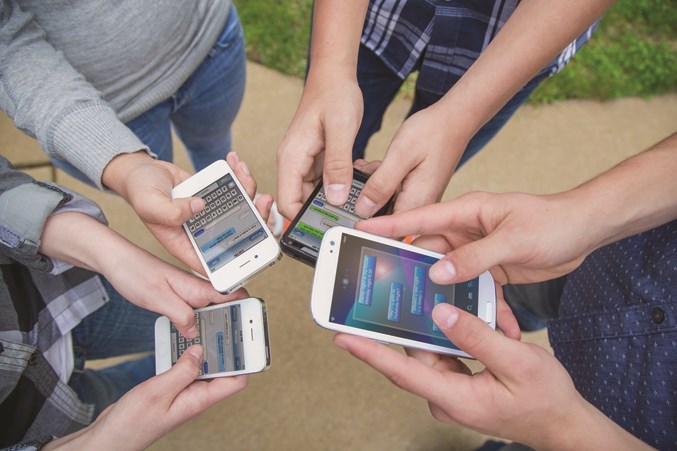Schools in St. Albert are preparing for new rules around cellphone use after the province announced on Monday that students’ cellphones will have to be “off and out of sight” during class.
It’s a welcome change for Lydia Yeomans, board chair at Greater St. Albert Catholic Schools.
“We have been talking about whether we should develop a policy for the last two and a half months,” Yeomans said.
Some teachers with the city’s Catholic schools have already found ways to limit cell phone use in their classrooms, such as requiring students to hand over their phones at the beginning of class.
But until now, teachers and schools have had some discretion around cellphone policies.
“What we really appreciated is that now we have a baseline of expectation,” Yeomans said. “It gives us a nice standard to adhere to.”
The province is letting school districts choose their own strategies for meeting the “off and out of sight” criteria.
Yeoman said that Greater St. Albert Catholic Schools is still planning its approach.
So far, the response from parents, and even some students, has been positive, she said.
“I just think it's nice that the province has said, ‘Look, this is a distraction for our kids, this is causing mental health issues, bullying issues,” she said.
Krimsen Sumners, superintendent for St. Albert Public Schools, said that cellphone use in schools can be “challenging,” but the problem is mostly with social media use.
“It is an ongoing concern in most schools,” Sumners said in an email.
“Most schools already ask students not to use their phones during class time, with exceptions,” Sumners said. “We also do not allow access to social media sites on our network, but students utilize their own data while at school to access various social media sites.”
St. Albert Public Schools does not yet know how it will administer the rule change, but Sumners said the division will have a plan ready for the fall.
Parent Desiree Daub has two teens who attend school in Sturgeon County. She thinks schools have been lenient about cellphone use in class.
“I think my daughter is going to have a hard time,” Daub said. “But I’m telling them, if [teachers] say not to use them, you’re not using them — and if you get in trouble, that's on you.”
Daub is in favour of the change but thinks it will be hard on teachers. “I guarantee they're going to get a lot of attitude over this,” she said.
“We have to break it now for the next generation so that this isn't something that's always in their classrooms.”
Education Minister Demetrios Nicolaides announced the new rules at a Monday press conference, where he pointed to research that suggests smartphones can impede students’ ability to focus and that students with more access to the devices performed worse on tests.
Schools must also restrict social media use, Nicolaides said.
Schools can make exceptions for students who use smartphones to help manage medical conditions such as diabetes or use the devices as a learning aid, Nicolaides said.
Over 68,000 parents, teachers and other school administrators responded to a survey from the province about the issue, Nicolaides said.
Some 90 per cent of respondents were “generally concerned” with cellphone use in school, 85 per cent believed the devices have negatively impacted student achievement and 81 per cent believed that the phones increase bullying.
School divisions will have flexibility when it comes to implementing the new rules. For example, some schools may allow students to keep their phones with them in class but demand that the phones are turned off, while others might require that students keep their cellphones in their locker during class. Schools can also decide on penalties for using phones in class.
“I don't believe it's very helpful or beneficial to students to just create an environment whereby we say, ‘It's totally banned, you can't use it, can't touch it, don't look at it,’” Nicolaides said. “They're going to experience technology use, smartphone use, social media use, as they become adults. So having them kind of graduate into that, I think is [responsible].”
Nicolaides said he would be speaking with school boards and teachers in the coming months and years to determine whether the new rules should be “tweaked.”




